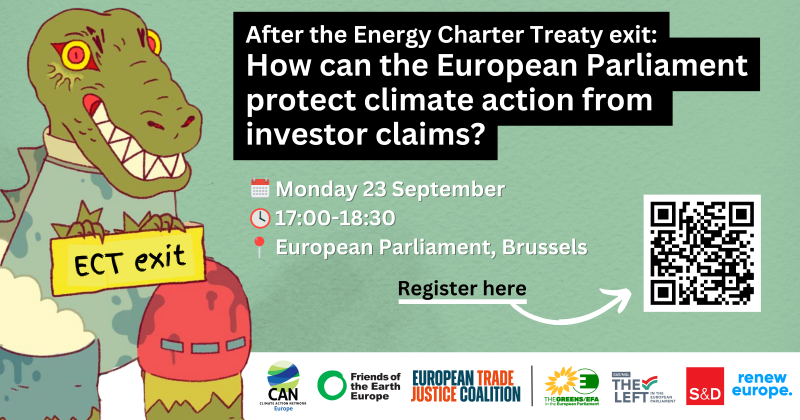The campaign for the EU institutions and European countries to exit the Energy Charter Treaty is a success story for European Parliamentary engagement.
Civil Society Organisations are organising a joint event with parliamentary groups the Greens, the Left/GUE, S&D and Renew, to create a moment to both celebrate the EU’s exit from the ECT and to look forward to how we can build upon this.
It is also only the start of the story because the problem of investment disputes blocking climate action does not end with the EU exit from the Energy Charter Treaty. There are also lessons to be learned from what was done around the Energy Charter Treaty to eventually build a broad consensus on action.
The Energy Charter Treaty shone a spotlight on the way in which investment disputes are being used by fossil fuel companies over climate policies. Recently we’re also seeing this used to challenge measures that were introduced to address the energy component of the cost of living crisis.
However, it does not stop there – while the Energy Charter Treaty is one of the largest nodes in the investment dispute system, it is not the whole system. The EU remains a part of many other investment treaties which contain the same investor state dispute system -ISDS. Individual EU member states have over 1400 bilateral investment agreements that include ISDS as well. This system has been criticised by international bodies like IPCC and the UN for its damaging effect on climate action and environmental protection measures.
Moreover, there are still a number of EU countries that remain part of the Energy Charter Treaty, including, Ireland, Sweden, Finland, Bulgaria, Belgium, Malta, Cyprus, Hungary, Austria, Croatia, Estonia, Greece, Lithuania, Latvia, the Czech Republic, Romania and Slovakia. Likewise, a solution in the form of an inter-se agreement has to be found to prevent further cases both intra-EU and with UK corporations.
Tackling the wider system is therefore vital. The ISDS regime privileges powerful corporations and their lawyers over public interest, and does nothing to ensure that the necessary investments are where mostly needed, especially to meet the Sustainable Development Goals (SDGs) and Paris Agreement targets. Meeting these goals is fundamental for all of us.
For these reasons, civil society groups including member organisations of the European Trade Justice Coalition, CAN Europe and Friends of the Earth Europe are organising a joint event in the European Parliament with supportive parliamentary groups.
Moderation: MEP Bernd Lange from the Progressive Alliance of Socialists and Democrats in the European Parliament – S&D
Date: Monday 23 September 2024
Time: 17.00 – 18.30 CET
Location: European Parliament, Treve 9V40
Translation: English-French and French–English
Speakers:
- Key note speaker: MEP Anna Cavazzini from the Greens / European Free Alliance
- MEP Marina Mesure from The Left Group in the European Parliament GUE/NGL
- MEP Marie-Pierre Vedrenne from Renew Europe Group
- Rob Davies: Former South African Minister of Trade and Industry Honorary Professor at the Nelson Mandela School – on South Africa’s experience terminating investment treaties.
- Clementine Baldon from Baldon Avocats making the case BITs of member states are not in line with EU treaties and can be challenged
Bios of the external speakers
Clémentine Baldon is a lawyer at the Paris bar. She founded Baldon Avocats, a law firm focusing on legal advice for public interest organizations and strategic litigation on trade law, investment protection, EU law, climate, corporate duty of care and greenwashing. Most notably, she represented 5 young victims of climate change related events in the ‘Exit ECT‘ case before the European Court of Human Rights which led to increasing pressure on governments to withdraw from the ECT. She also regularly publishes legal articles on ISDS and trade (eg. recently “Neutralising the ECT Sunset Clause Inter Se”, ICSID Review, May 2024).
Rob Davies is an Honorary Professor at the Nelson Mandela School of Public Governance at the University of Cape Town and a member of the Advisory Council on Trade and Industrial Development appointed by the Secretary General of the African Continental Free Trade Area. Between 2009 and 2019 he served as South Africa’s Minister of Trade and Industry. He was elected as a Member of Parliament in the first democratic election in 1994, serving continuously for 25 years. Before entering Parliament he was Professor and Co Director of the Centre for Southern. African Studies at the University of the Western Cape and professor auxiliar at Eduardo Mondlane University in Maputo, Mozambique between 1979 and 1990. Academically he holds an honours degree in economics from Rhodes University, a Masters in International Relations from the University of Southampton and a doctorate from the University of Sussex. His most recent book, Towards a New Deal: A Political Economy of the Times of my Life, was published by Jonathan Ball in 2021.
For more information, reach out to Audrey Changoe, Trade and Investment Policy Coordinator at Climate Action Network (CAN) Europe, audrey.changoe@caneurope.org.




